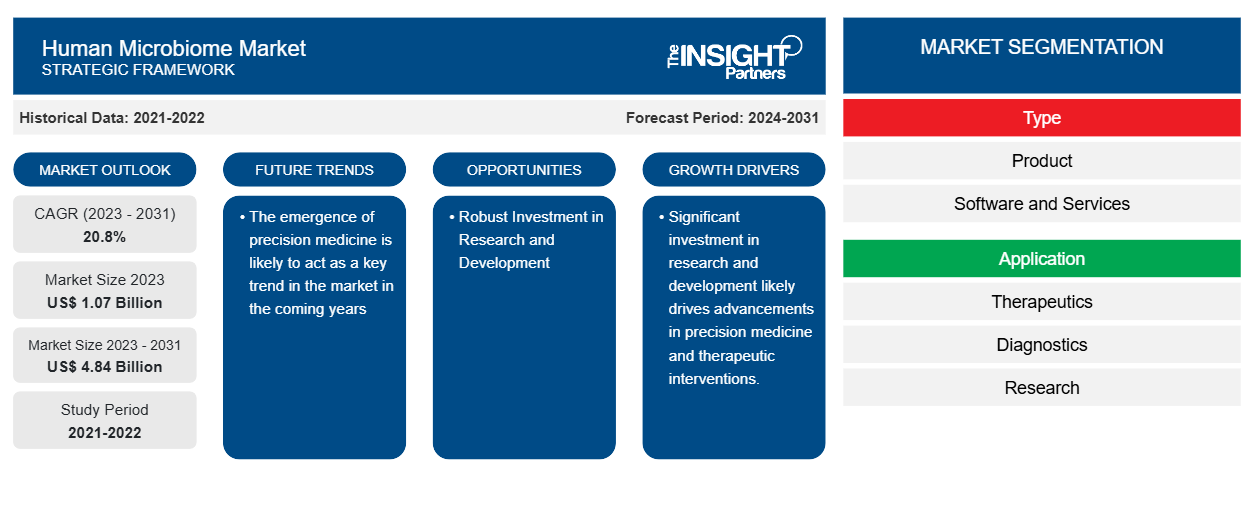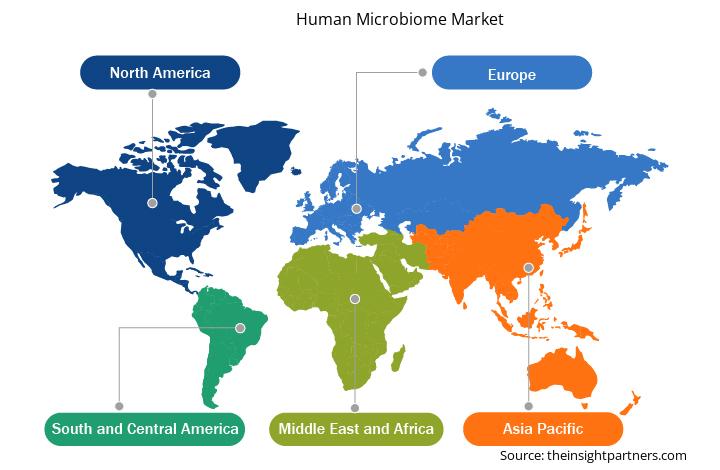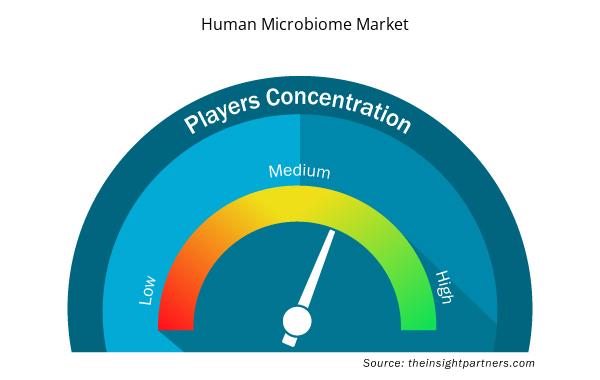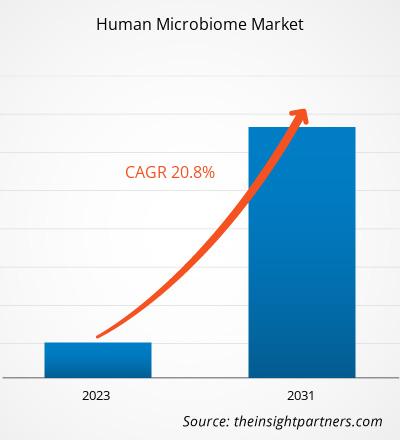The human microbiome market size is projected to reach US$ 4.84 billion by 2031 from US$ 1.07 billion in 2023; the market is estimated to register a CAGR of 20.8% during 2023–2031. The emergence of precision medicine is likely to act as a key trend in the market in the coming years.
Human Microbiome Market Analysis
The human microbiome industry's growth, innovation, and market dynamics are greatly influenced by the investments made by major players in the market. Major players are engaged in making significant investments in research and development to create novel probiotics, diagnostics, and treatments based on the microbiome. These expenditures stimulate innovation, identifying new strains, modes of action, and medicinal uses. Clinical trials receive a large amount of funding, which is essential for demonstrating the effectiveness and safety of products based on the microbiome. For example, Kanvas Biosciences, a pioneer in microbiome mapping technology, announced a US$ 12 million Pre-Series A funding round in June 2023. The company's proprietary platform technology, which has the potential to transform drug development for illnesses linked to the microbiome, will be further developed with the help of the investment. These partnerships make sharing resources, know-how, and technological advancements easier, speeding up product development.
Additionally, notable investors such as Seventure Partners and Flagship Pioneering are actively funding companies that analyze microbiome data, reflecting a growing recognition of the microbiome's role in health. Thus, significant investment in research and development likely drives advancements in precision medicine and therapeutic interventions, thereby creating ample opportunities in the market.
Human Microbiome Market Overview
New pharmaceuticals in the pipeline, product development and enhancement, and an increase in strategic partnerships are significant factors benefiting the microbiome therapies market in China. Xbiome Inc., a leading AI-driven microbiome therapeutics firm, acquired the clinical-stage M201 program from Assembly Biosciences, Inc., a clinical-stage biotechnology company involved in developing cutting-edge treatments for viral disorders such as hepatitis B. The increasing prevalence of target disorders is expected to drive the growth of the human microbiome market. In China, in the future, as research continues to reveal the significant role of the human microbiome in various health conditions, there is a growing interest in developing microbiome-based therapies. This is particularly true for conditions such as gastrointestinal disorders, autoimmune diseases, and metabolic disorders, where the microbiome's influence is well-established. The potential of microbiome therapeutics as more effective and personalized treatments presents a promising opportunity for market expansion. People in China have an IBS prevalence of 2.3–15.8%, according to National Institute of Health statistics released in June 2021.
Customize This Report To Suit Your Requirement
You will get customization on any report - free of charge - including parts of this report, or country-level analysis, Excel Data pack, as well as avail great offers and discounts for start-ups & universities
Human Microbiome Market: Strategic Insights

- Get Top Key Market Trends of this report.This FREE sample will include data analysis, ranging from market trends to estimates and forecasts.
Customize This Report To Suit Your Requirement
You will get customization on any report - free of charge - including parts of this report, or country-level analysis, Excel Data pack, as well as avail great offers and discounts for start-ups & universities
Human Microbiome Market: Strategic Insights

- Get Top Key Market Trends of this report.This FREE sample will include data analysis, ranging from market trends to estimates and forecasts.
Human Microbiome Market Drivers and Opportunities
Government Initiatives
Government initiatives and support programs significantly impact the human microbiome market growth. Governments frequently give large sums of money and grants for studies on the human microbiome. This financial assistance speeds up the development of novel treatments, devices, and diagnostics. Funding supports the innovation and commercialization of products by startups and small-to-medium-sized enterprises (SMEs) in the human microbiome sector. For instance, NIH launches a human microbiome project. This project can transform how we understand human health and prevent, diagnose, and treat various conditions. Part of the NIH's Roadmap for Medical Research, the Human Microbiome Project will award US$ 115 million to researchers over the next five years. Microbiome-based therapeutics is a booming field. The interest in microbiome-based therapies has increased due to the recent approval of Vowst, a medication from Seres Therapeutics, to treat C. difficile infections. Reclassifying microbiome probiotics as pharmaceuticals is a growing trend that the recent development of microbiome-based therapeutics may have influenced. Significant progress is being made in the European Union (EU) to reclassify vaginal probiotics as pharmaceutical drugs.
Robust Investment in Research and Development
The potential of the human microbiome to transform the healthcare industry has led to a recent surge in investments in research and development. Trillions of bacteria, fungi, and viruses that live in and on the human body make up the human microbiome, which is essential to good health and the prevention and treatment of diseases. The development of therapies based on microbiomes is receiving significant funding from biotech startups and pharmaceutical companies. One of the first microbiome startups in India, Xome Life Sciences, for example, focuses on every facet of the microbiome. The company is developing prognostic, diagnostic, and therapeutic tools based on microbiomes to help people live healthier lives and make better decisions about their health. A recent FDA-approved treatment developed by Seres Therapeutics for recurrent Clostridium difficile infection, a gastrointestinal diseases targeted by microbiome-based drugs. Vedanta Biosciences raised substantial money to build their pipeline of immunotherapies derived from microbiomes for autoimmune disorders and cancer. Notable investors such as Seventure Partners and Flagship Pioneering are actively funding companies that analyze microbiome data, reflecting a growing recognition of the microbiome's role in health. Thus, significant investment in research and development is expected to drive advancements in precision medicine and therapeutic interventions, thereby creating ample opportunities in the market.
Human Microbiome Market Report Segmentation Analysis
Key segments that contributed to the derivation of the human microbiome market analysis are type, application, disease type, and geography.
- The human microbiome market, by type, is divided into product and software and services. The product segment is further bifurcated into probiotics and prebiotics. The product segment held a larger share of the human microbiome market in 2023, and it is expected to register a higher CAGR during 2023–2031.
- Based on application, the human microbiome market is categorized into therapeutics, diagnostics, and research. The therapeutics segment accounted for the largest share of the human microbiome market in 2023.
- Based on disease type, the human microbiome market is segmented into obesity, diabetes, autoimmune disorders, cancer, GIT Disorders, and others. The GIT Disorders segment held the largest share of the human microbiome market in 2023.
Human Microbiome Market Share Analysis by Geography
The geographic scope of the human microbiome market report is mainly divided into 5 major regions: North America, Europe, Asia Pacific, the Middle East & Africa, and South & Central America. North America dominated the market in 2023. The market growth in North America is characterized by robust research activities on the human microbiome, increased funding for biotechnology, a rise in health consciousness among the population, and an increase in the demand for probiotics and prebiotics to treat chronic diseases. The applications of the human microbiome are rapidly growing in the field of biotechnology; it is emerging as a significant therapy to treat various chronic diseases. Research and development on human microbiome-based therapeutics has grown significantly in the US, leading to increased private investment and advances in environmental microbiome engineering. According to an article published in Nature in 2019, over the past decade, the US has made the largest investment of ~US$ 1 billion toward human microbiome research. Approximately 20% of this funding has been utilized for two phases of the Human Microbiome Project (HMP), which aims to create the necessary research resources for studying the human microbiome. HMP was launched in 2007 to establish a comprehensive toolbox consisting of reference data sets, computational techniques, analytical methods, and clinical protocols. This endeavor has proven to be successful, as roughly 75% of the NIH grant recipients for microbiome research from 2012 to 2016, working across more than 100 diseases, relied on HMP data and tools in their funding applications. Financed by the US National Institutes of Health (NIH), the HMP has significantly accelerated human microbiome research both within the US and on a global scale. The rise in research activities is likely to offer opportunities for the development of innovative therapies in the market.
Human Microbiome Market Regional Insights
The regional trends and factors influencing the Human Microbiome Market throughout the forecast period have been thoroughly explained by the analysts at Insight Partners. This section also discusses Human Microbiome Market segments and geography across North America, Europe, Asia Pacific, Middle East and Africa, and South and Central America.

- Get the Regional Specific Data for Human Microbiome Market
Human Microbiome Market Report Scope
| Report Attribute | Details |
|---|---|
| Market size in 2023 | US$ 1.07 Billion |
| Market Size by 2031 | US$ 4.84 Billion |
| Global CAGR (2023 - 2031) | 20.8% |
| Historical Data | 2021-2022 |
| Forecast period | 2024-2031 |
| Segments Covered |
By Type
|
| Regions and Countries Covered | North America
|
| Market leaders and key company profiles |
Human Microbiome Market Players Density: Understanding Its Impact on Business Dynamics
The Human Microbiome Market market is growing rapidly, driven by increasing end-user demand due to factors such as evolving consumer preferences, technological advancements, and greater awareness of the product's benefits. As demand rises, businesses are expanding their offerings, innovating to meet consumer needs, and capitalizing on emerging trends, which further fuels market growth.
Market players density refers to the distribution of firms or companies operating within a particular market or industry. It indicates how many competitors (market players) are present in a given market space relative to its size or total market value.
Major Companies operating in the Human Microbiome Market are:
- MaaT Pharma
- Ferring Holdings SA
- Finch Therapeutics Group Inc
- AOBiome Therapeutics Inc.
- Seres Therapeutics Inc
- Merck & Co Inc
Disclaimer: The companies listed above are not ranked in any particular order.

- Get the Human Microbiome Market top key players overview
Human Microbiome Market News and Recent Developments
The human microbiome market is evaluated by gathering qualitative and quantitative data post primary and secondary research, which includes important corporate publications, association data, and databases. A few of the developments in the market are listed below:
- MaaT Pharma announced the launch of a retrospective multicenter trial called CHRONOS in Europe. Its objective is to provide the Company efficacy data for 3rd-line therapies for patients not receiving MaaT013 or any microbiome intervention. This study was not requested by regulatory authorities and does not impact cash projections, as funding has already been secured. (Source: MaaT Pharma, Company Website, March 2024).
- Seres Therapeutics, Inc. has received U.S. Food and Drug Administration (FDA) clearance for SER-155 under an Investigational New Drug (IND) application. SER-155 is an investigational oral, rationally-designed, cultivated microbiome therapeutic designed to reduce the incidence of gastrointestinal antibiotic-resistant bacterial infections, bacteremia, and graft-versus-host disease (GvHD) in immunocompromised patients. (Source: Seres Therapeutics, Inc, Company Website, June 2021)
Human Microbiome Market Report Coverage and Deliverables
The "Human Microbiome Market Size and Forecast (2021–2031)" report provides a detailed analysis of the market covering below areas:
- Human microbiome market size and forecast at global, regional, and country levels for all the key market segments covered under the scope
- Human microbiome market trends, as well as market dynamics such as drivers, restraints, and key opportunities
- Detailed PEST and SWOT analysis
- Human microbiome market analysis covering key market trends, global and regional framework, major players, regulations, and recent market developments
- Industry landscape and competition analysis covering market concentration, heat map analysis, prominent players, and recent developments for the human microbiome market
- Detailed company profiles
- Historical Analysis (2 Years), Base Year, Forecast (7 Years) with CAGR
- PEST and SWOT Analysis
- Market Size Value / Volume - Global, Regional, Country
- Industry and Competitive Landscape
- Excel Dataset


- Dried Blueberry Market
- Explosion-Proof Equipment Market
- Vessel Monitoring System Market
- Dry Eye Products Market
- Legal Case Management Software Market
- Fish Protein Hydrolysate Market
- Quantitative Structure-Activity Relationship (QSAR) Market
- Sweet Potato Market
- Data Center Cooling Market
- Dairy Flavors Market

Report Coverage
Revenue forecast, Company Analysis, Industry landscape, Growth factors, and Trends

Segment Covered
Product , Disease and Application and Geography

Regional Scope
North America, Europe, Asia Pacific, Middle East & Africa, South & Central America

Country Scope
Argentina, Australia, Brazil, Canada, China, France, Germany, India, Italy, Japan, Mexico, RoAPAC, RoE, RoMEA, RoSCAM, Saudi Arabia, South Africa, South Korea, Spain, United Arab Emirates, United Kingdom, United States
Frequently Asked Questions
North America dominated the market in 2023.
Significant investments by key market players and government initiatives are among the most significant factors fueling the market growth.
The emergence of precision medicine is expected to emerge as a prime trend in the market in the coming years.
MaaT Pharma; Ferring Holdings SA; Finch Therapeutics Group Inc; AOBiome Therapeutics Inc.; Seres Therapeutics Inc; Merck & Co Inc; Yakult Honsha Co., Ltd; Rebiotix; Inc; IFF Nutrition & Biosciences; and Synthetic Biologics, Inc are among the key players in the market.
The human microbiome market value is expected to reach US$ 4.84 billion by 2031.
The market is expected to register a CAGR of 20.8% during 2023–2031.
Trends and growth analysis reports related to Life Sciences : READ MORE..
The List of Companies - Human Microbiome Market
- MaaT Pharma
- Ferring Holdings SA
- AOBiome Therapeutics Inc.
- Seres Therapeutics Inc
- Merck & Co Inc
- Yakult Honsha Co., Ltd
- Rebiotix, Inc
- IFF Nutrition & Biosciences,
- Synthetic Biologics, Inc

 Get Free Sample For
Get Free Sample For